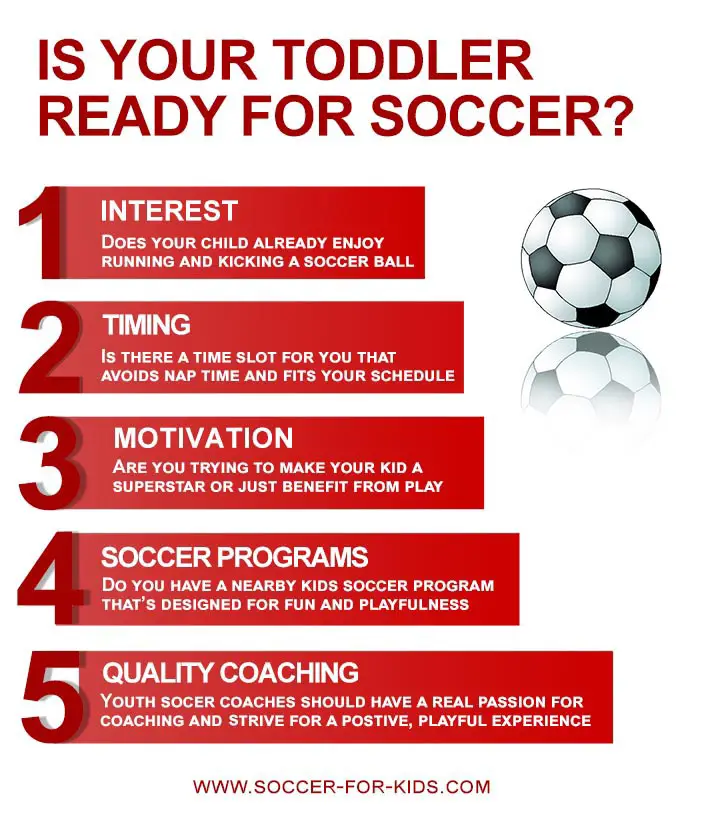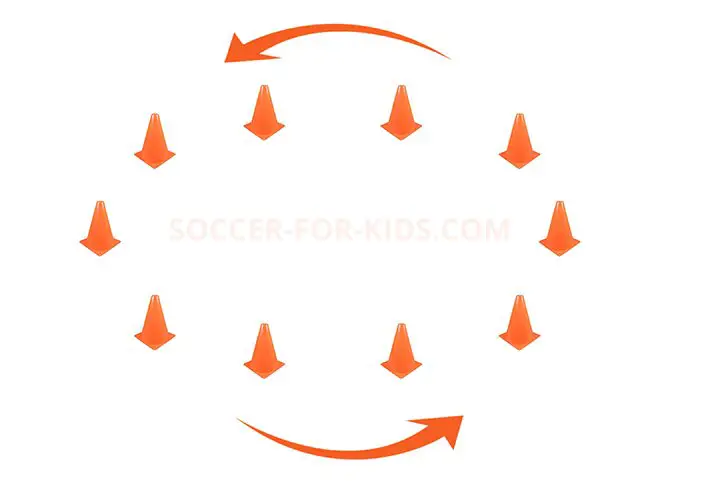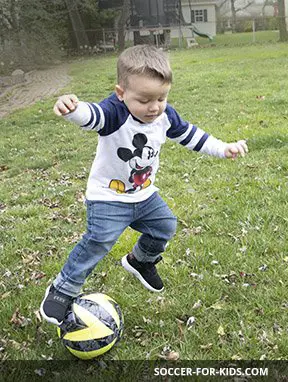The best Age To Start Soccer For Your child
The 5 things to look at first

Your child just turned 2, is an active kid, and shows a definite interest in running around and kicking a soccer ball. You're wondering what's the best age to start soccer for her. This post will help you decide the best time to enroll your child in organized soccer.
These thoughts are based on involvement in youth soccer for almost 30 years, including owning a children's youth soccer coaching franchise. You can use this article as a helpful guide to help you determine how old your child should be to start playing organized soccer.
5 things to consider
- Interest and Maturity of Your Child
- Your Soccer Goals
- The Type of Soccer Program
- The Quality of the Soccer Coach
- Timing
are toddlers too young to play soccer
 5 year old soccer players
5 year old soccer playersNo, the majority of 2 year old children are ready to play soccer. That's the simple answer, but read on for the more important question and to get a more complete answer.
The real question for you to ask is should you enroll them and pay for an organized soccer season. For kids that haven't even turned two yet the question isn't if they're old enough to play soccer. As soon as your son can get up on his two feet without falling, he can start kicking the ball. If he's enjoying himself, encourage him to keep going.
He's getting the benefits of developing those gross motor skills that turn into fine motor skills. He's also developing balance, foot-eye coordination as well as judging speed and anticipation. You can easily progress by creating a makeshift goal to score in or getting one of the foldable pop-up nets to play with.
The question you need answered is if you want to have them enrolled in an organized soccer league. Are the youth soccer leagues worth the money and will your child benefit?
I can tell you with certainty that, as a young toddler, my youngest child was having fun dribbling around with decent skill when he was just two years old. He had the advantage of watching his older siblings play. That made is only natural for him to want to copy the activities of his older siblings and play too.
At that time, back in the early 1990s there weren't any options at all for toddlers and preschoolers to play in an organized program in towns and counties or children's soccer coaching businesses like today. Soccer for kids was just starting to gain popularity. Here's the good news: You have a variety of options on the type of soccer program to start with for your child.
Youth soccer has exploded and there are several venues in your area to choose from. The challenge is to determine if your child will benefit from playing organized soccer with other children and follow the directions of a soccer coach.
the 5 DETERMINING factors
Here are the 5 consideration to think about, in detail, to figure out if your child is ready for participating in an organized soccer program or would be better suited to just kick it around with dear old dad in the backyard.
1. Interest and Maturity of your young player
Your son or daughter is unique in many ways. Some kids are "ready" at an early age and some aren't. Young children develop different skills, interests, abilities, motivation as they mature. Exposing them to new experiences is generally a good thing, provided you make sure it's mostly a positive experience.
It's not a good idea force participation by threatening. Use positive encouragement. It's often helpful to tell a child how much fun they're going to have. Explaining a few of the things that may happen will help squelch any anxiety your child may be feeling.
There are mixed feelings about offering "prizes" as a reward for participation. Your individual parenting philosophy will guide you best with this choice. Some parents find it very helpful to offer a reward to the child if they fully participate in the soccer activities each day of soccer.
2. your soccer goals
It's important to have your goals in mind before you look at any specific age-based soccer program. This doesn't have to be a formal written plan of objectives, just an idea of what's really important to you as the parent of a young soccer player.
My wife and I were guilty of sending our kids to a prestigious, high-end summer soccer camp when they were preteens. It was a bit too serious and intensive for their level of interest in soccer. Fortunately, it didn't cause them to quit and they continued to play through the high school years. They weren't motivated to become ultimate level players-they just liked playing soccer.
Here's a little story on what I mean by knowing what you want your child to gain from participating in organized soccer:
In the soccer business I owned, we once had a child who was barely participating in class at one of the preschools where we ran a 10-week soccer program for 2-6 year olds. We contacted the parent, discussed his situation, and was surprised that she wanted her child to continue anyway.
Interestingly enough, her goal was to have her child get more outside time during the school day and get more exposure to organized playtime, even if it meant just watching her classmates play soccer. Her goal was to have her daughter remain in the program to experience the environment of the soccer sessions.
If your goal is simply for your child to have fun while getting exercise, soccer is one of the best sports you can choose to accomplish this. Many of the other typical sports really need more developed fine motor skills to participate. Basic dribbling in soccer can be achieved in soccer as soon as your child is able to walk.
3. which soccer program is the best for your child
As you decide on the best age to start soccer for your child, you'll also need to find the right location and the best program for your needs. There are lots of kiddie soccer programs all over the country. Here are a few of the categories that may have a kid's soccer program for your child's age:
- Franchised program like Soccer Shots, i9 Sports, Happy Feet, LilKickers, or Mighty Kicks.
- Your town's recreational league.
- A playgroup organizing their own soccer sessions.
- A private club designed to develop elite players.
Ask about a refund if your child does not enjoy it after 2 or 3 weeks. My policy was when a parent was doubtful that their child would participate, I told them to enroll without paying for the tuition. Most yout soccer companies may not allow this, but it doesn't hurt to ask. I found this took the pressure off of the parents and I could collect the tuition money a few weeks into the season.
As an Amazon associate, soccer-for-kids receives a small commission for qualifying purchases. There is no cost to you. Zero!
4. soccer play schedule
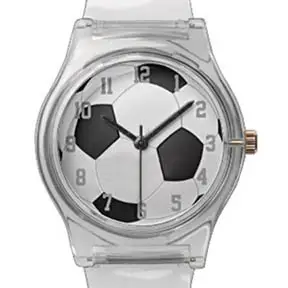
You learn from your mistakes and one of the mistake I made was on the timing of one of my soccer programs for kids ages 3-5. Not all, but a few of the parents gave me feedback through my end-of-the-year surveys that the timing of our soccer class coincided with nap time.
A few times, the kids would fall asleep in the car on the way to play soccer. For many parents, it's then a challenge to adjust their child's emotional state upon being woken up for soccer practice.
The advice is to be aware of your child's need and timing for naps and try to avoid a soccer session that will cause a disruption. Secondly, don't forget your own schedule is important. If you're overly rushed in getting your toddler to soccer in time, it may affect your mental state as well.
Your young soccer play is quite capable of getting "negative vibes" from mommy or daddy when their stressed by a hectic schedule. That can have an effect on the overall experience of participating in youth soccer.
5. The coach
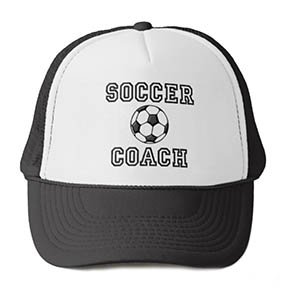
The quality of the coaching is probably the single most important factor in how much your young child gets out of their soccer experience. Here's a list of the 5 most important qualities a soccer coach should have to coach your preschool or toddler in soccer.
- ENERGY AND ENTHUSIASM. Kids (and some adults) have a short attention span. Particularly with kids that are just starting with soccer, coaches need to keep the energy level up high.
- PATIENCE. Let's face it. children don't always behave perfectly for you. Typically, the brand new soccer players will use their hands on the ball or continue to dribble the ball even when they've traveled off the field
- PASSION. If a coach is having fun and enjoys working with very young children at a strong level, the kids will feel that and that enthusiasm will rub off on the players.
- EXPERIENCE. Brand new coaches have little experience in dealing with new situations. Toddlers and preschoolers are a unique age group to deal with and the more experienced coaches can handle
- SILLINESS. One of the things we'd do when hiring a coach is test their ability to act silly. Really. We found that the coaches who were willing to act a little weird, gesture in funny ways, make silly animal sounds, were the ones that captivated the interest of the kids.
One quick point on whether a high level soccer player makes a good soccer coach for little kids. The best age to start soccer is definitely quite young. At this level, the 2, 3 , 4, and 5 year old age group, a thorough knowledge of the game of soccer really isn't important at all. It's the character traits mentioned above that matter most for these young ages.
Although some of the soccer credentials and accomplishments are admirable with some soccer coaches, this doesn't necessarily translate into being a great coach for very young children. Some of the really best soccer coaches I employed came to work for me with little or no initial soccer experience.
How do you introduce your child to soccer?
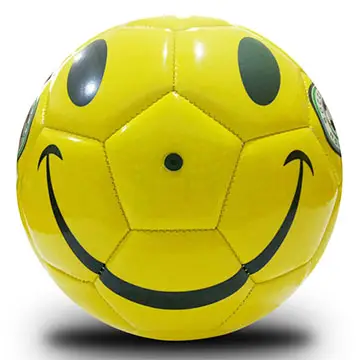
One of the best ways to introduce your child to soccer is to buy her a new soccer ball. Wrap it up as a special present. Everything in soccer revolves around the ball, so it's a great way to introduce your child to soccer at any age. You don't have to wait for a birthday or holiday. Let's face it, when a kid sees a wrapped up present, they get excited if they know it's for them.
The first thing your child will want to do with their new soccer ball is play with it. That's your chance to show her what to do. Show and tell her child about dribbling with little touches to move the ball. Say "tick tock" with every little touch of the ball and you,ve got the skill of dribbling started. A fun, positive experience can be enhanced with high fives and fist bumps used as positive reinforcement of small little successes.
Here's an article I posted on this website some of the really unique soccer balls you can get for your child. These balls could definitely help get your child off to an enthusiastic start because of their appeal. Unique Soccer Balls.
do a trial run with your child and organized soccer
There are 2 ways you can do a trial run soccer practice with your preschooler to get an idea if they're ready to start playing soccer on a consistent basis. The first method will employ you as the soccer coach and the second will have someone else as the couch.
1. START with soccer pRACTICES AT HOME
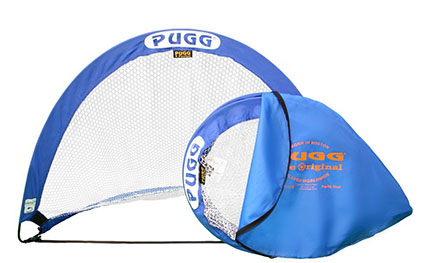 Kids Soccer Goal
Kids Soccer GoalKeep it simple. First, get a soccer ball!
Plan a regular time of the day and repeat a few times to develop at least somewhat of a routine for a soccer playtime. You can develop your own simple curriculum based on your child's age and abilities. Try teaching these very simple soccer moves first.
Have it start with a basic warm-up. This can be a game of tag, a imaginative race from one spot to another like an animal, a favorite superhero, or anything that involves the imagination.
Follow the warm-up with learning to dribble the soccer by kicking the ball gently within a defined area-that's your temporary soccer field. The third part of your practice should be a game where your child scores goals. Your goal can be any small target, including the typical folding soccer goals. Here's a related article on this site about what size goals are used for each age group of children.
As an Amazon associate, soccer-for-kids receives a small commission for qualifying purchases. There is no cost to you. Zero.
2. enroll in a local program
Contact the administrator of the soccer program you're considering and see if they offer any trial runs. Our soccer franchise would offer free demo days for parents to bring their kids for a sample session.
Alternatively, find out what their refund policy is. A well run program should recognize that 100% of the kids won't prosper in their soccer program and give you a full refund after a certain number of weeks, usually two or three.
final comments on when to start your child in soccer
I hope you found this article on the best age to start soccer worthwhile reading. The best age to start soccer really depends on your individual child and the factors we discussed above. Two year old children can play soccer and have fun if you follow a few simple guidelines.
Kids can have have a blast and develop motor skills with a soccer ball at the same time, as soon as they can walk. You don't need protective equipment at first, like shin guards or goalie gloves.
You don't need to enroll them in a paid youth soccer program initially for them to have kicking the ball around. If you'd like them to have some success on the field as a player, the younger they start the better. Like most other activities including sports, the more you play at something the better you get. Much like the child who attend a preschool, they have a easier start over the child who is just starting the school experience for the first time as a new kindergarten student.
A good soccer program starts with fun as the number one objective. The more fun it is, then the more your child will want to play on a regular basis, and that will translate to more growth as a player and as an individual.

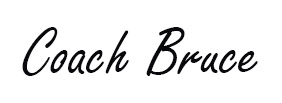
Soccer coach Bruce Lovelace started playing soccer in 1974 when, as a young boy, he constructed his own makeshift soccer goal. He played in high school, then in college and beyond. He started to coach his own children in the 1990s and then ran a Soccer Shots franchise for 12 years. Now, Coach Bruce publishes the soccer-for-kids.com website. Find out more about youth soccer coach Bruce Lovelace and what inspires this website.
As an Amazon associate, soccer-for-kids receives a small commission for qualifying purchases. There is no cost to you.
Soccer-for-kids.com is a participant in the Amazon Services LLC Associates Program, an affiliate advertising program designed to provide a means for sites to earn advertising fees by advertising and linking to Amazon.com
